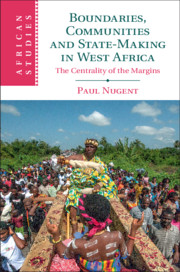Book contents
- Boundaries, Communities and State-Making in West Africa
- African Studies Series
- Boundaries, Communities and State-Making in West Africa
- Copyright page
- Dedication
- Contents
- Figures
- Maps
- Tables
- Acknowledgements
- Abbreviations
- 1 Centring the Margins
- Part I From Frontiers to Boundaries
- 2 Configurations of Power in Comparative Perspective
- 3 Port Cities, Frontiers and Boundaries
- Part II States and Taxes, Land and Mobility
- Part III Decolonization and Boundary Closure, c.1939–1969
- Part IV States, Social Contracts and Respacing from Below, c.1970–2010
- Conclusion
- Bibliography
- Index
- African Studies Series
3 - Port Cities, Frontiers and Boundaries
Spatial Lineages of the Colonial State
from Part I - From Frontiers to Boundaries
Published online by Cambridge University Press: 08 June 2019
- Boundaries, Communities and State-Making in West Africa
- African Studies Series
- Boundaries, Communities and State-Making in West Africa
- Copyright page
- Dedication
- Contents
- Figures
- Maps
- Tables
- Acknowledgements
- Abbreviations
- 1 Centring the Margins
- Part I From Frontiers to Boundaries
- 2 Configurations of Power in Comparative Perspective
- 3 Port Cities, Frontiers and Boundaries
- Part II States and Taxes, Land and Mobility
- Part III Decolonization and Boundary Closure, c.1939–1969
- Part IV States, Social Contracts and Respacing from Below, c.1970–2010
- Conclusion
- Bibliography
- Index
- African Studies Series
Summary
This rap over the knuckles, which was administered more than once by political leaders in London, holds a double significance for what follows. At one level, it represents an exchange between an embodiment of the British state, namely the Minister of War and the Colonies, and his Governor in Sierra Leone – in a matter pertaining to the subordinate settlement of the Gambia. In that sense, it represents the history of a European state ‘at work’. But at another level, its content touches directly on the issue of what representatives of the Crown believed they ought to be doing in West Africa. In line with the argument pursued in Ronald Robinson and Jack Gallagher’s Africa and the Victorians, the unequivocal message was that Britain had no interest in raising expectations of military assistance amongst its local allies, far less in acquiring territorial commitments.2 Putting it bluntly, as British politicians were often wont to do, colonial possessions cost money and brought unwelcome and messy entanglements. As such, this despatch provides a useful starting point for an attempt to reconstruct the processes of colonial state-making in the Senegambia and along the Gold Coast, in which the proliferation of unanticipated entanglements was nothing less than foundational.
- Type
- Chapter
- Information
- Boundaries, Communities and State-Making in West AfricaThe Centrality of the Margins, pp. 101 - 154Publisher: Cambridge University PressPrint publication year: 2019



